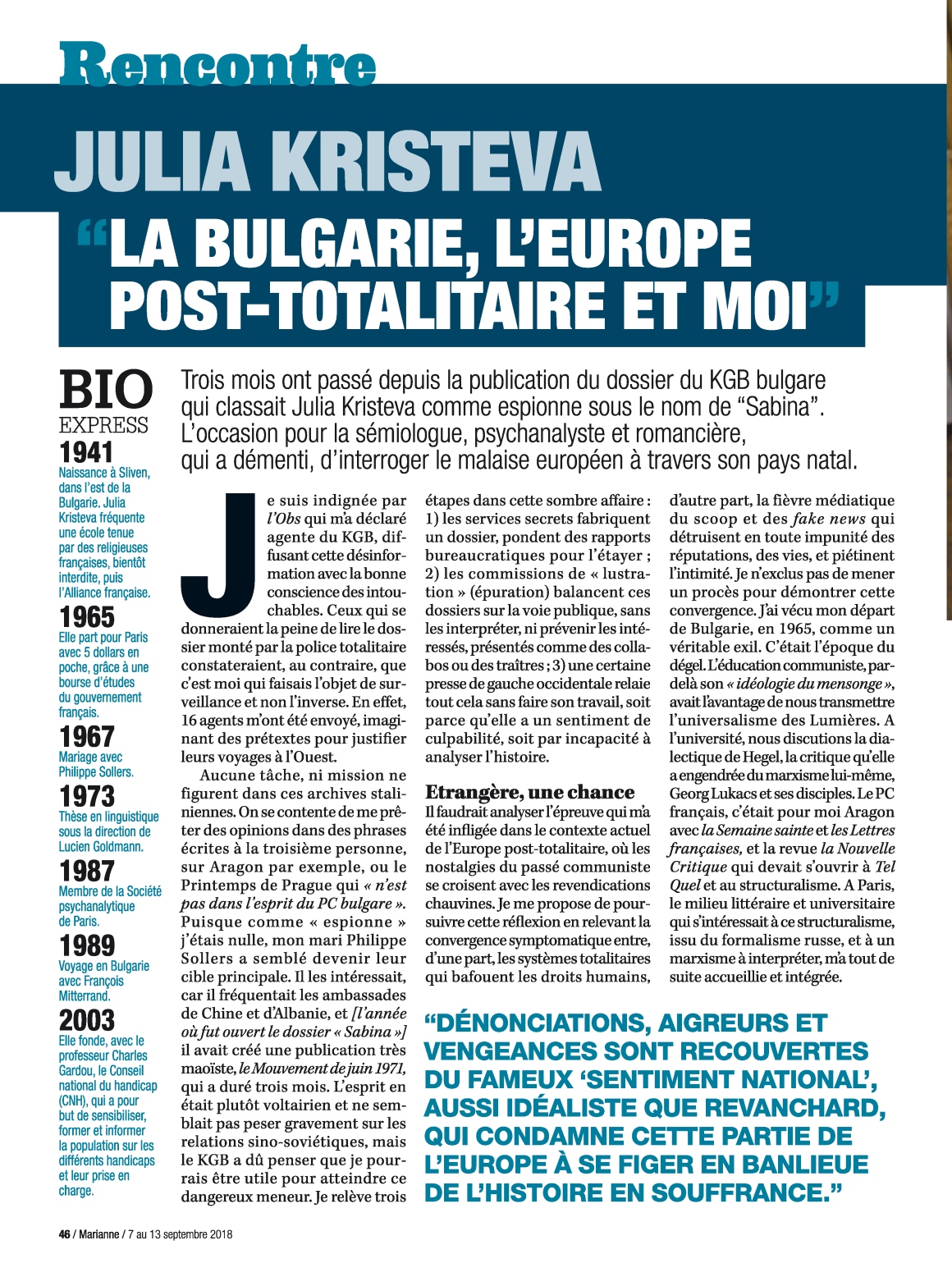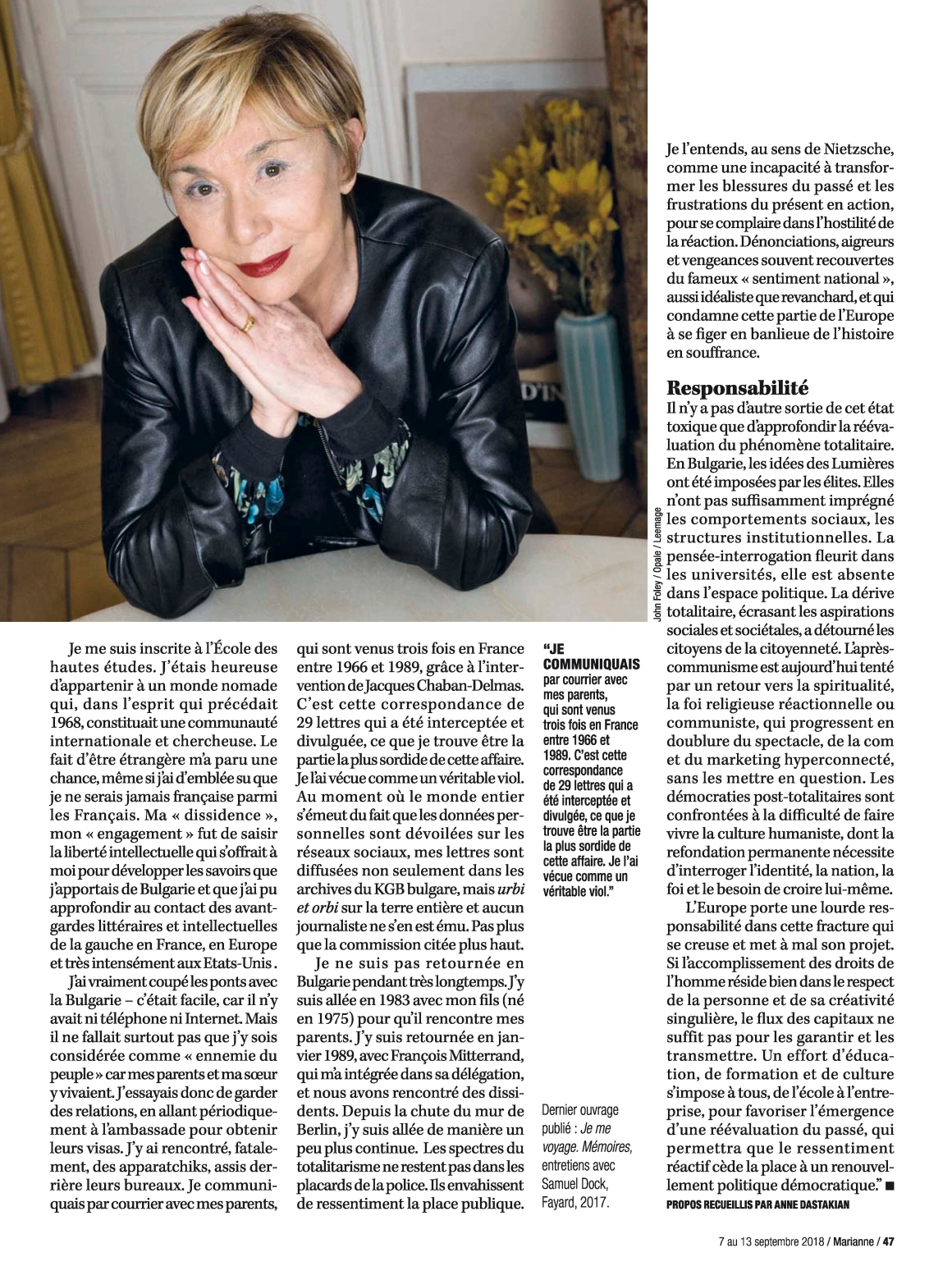 |
|
Bulgaria,
Post-Totalitarian Europe, And Me
It’s been three months
since the publication, via Sofia, of the Bulgarian communist
I
am indignant that Le
Nouvel Observateur, the
French weekly, openly declared me a KGB agent, spreading this falsehood with
the impunity of those who think they are not accountable to anyone. Had the journalists taken the trouble to read
the dossier fabricated by the totalitarian police, they would have found clear
evidence that I was the one subjected to surveillance, not the other way
around. Several journalists in Bulgaria in fact did just this (1), declaring the dossier empty and fit only to be thrown in the
trash, along with the tendentious Commission as well. Indeed some sixteen agents were sent my way
in order to contact just one “spy. ” They came up with imaginary pretexts to
justify their trips to the West. My
husband, Philippe Sollers, who distrusted pro-Soviet regimes, set his foot down
against our receiving any Bulgarian visitors. He adamantly refused to see them. That we dined with this apparatchik
who claims he “recruited” me is totally implausible.
Revealingly,
there are no informant missions assigned to me in these Stalinist archives.
Whoever devised them merely attributed opinions to me expressed in the 3rd
person, for example on Aragon or on the “Prague Spring” as being “not in the
spirit of the Bulgarian Communist Party…” Because I made such a lousy “spy,” Sollers seemed to become their
primary target. He was of interest to
them because he spent time at the Chinese and Albanian embassies, and (the year
the “Sabina” dossier got underway), founded the Maoist publication, Le Mouvement de juin 1971 ; it lasted three months
and was Voltaire-like in spirit. One could hardly say it weighed heavily on
Sino-Soviet relations! But the secret agents must have thought I’d be useful in
getting to this “dangerous” leader.
Allow
me to highlight the three stages of this dark business : 1/ The Secret Services create
a dossier, filling it with bureaucratic reports to give it weight ; 2/ The
« Lustration » (purging) Commission, in charge of the secret police
archives, tosses these dossiers to the public without analysing them, without
warning those they’ve accused of being It
is important to situate and analyse the ordeal that was inflicted upon me in
the larger, current context of post-totalitarian Europe where nostalgia for
communism gets entangled with
I
experienced my departure from Bulgaria in 1965, with a scholarship from the
French government, as an exile. It was
the era of the thaw. Communist
education, beyond its “lying ideology” which Soljenitsyne decried as more
pernicious than restrictions on freedom, did nevertheless convey the
universalism of the Enlightenment. At
university we discussed Hegel’s dialectic, the critique it produced of
Marxism, Georg Luckas and his
disciples. The French Communist Party
was, for me, Aragon with his La Semaine sainte and Les Lettres françaises, and also the review, La
I
enrolled at the École des Hautes Études and took Lucien Goldmann’s seminar.
I
therefore cut ties with Bulgaria (this was easy in an era without the Internet
or phones) but obviously not with my family—who came to France three times
between 1966 and 1989 thanks to the intervention of Jacques Chaban-Delmas
(contacted by my in-laws in Bordeaux)—and with whom I corresponded by
mail. It was this correspondence of 29
letters that was intercepted and divulged in the Bulgarian dossier. This is
what I find to be the most sordid part of this whole affair—a total violation
of my privacy. At the very moment when the world is troubled by the fact that
personal information is being exposed without permission via social media, my
letters have been diffused, not only in the Bulgarian KGB archives, but
throughout the entire world and not a single journalist was troubled by that.
The Commission in Sofia wasn’t troubled either.
It
was imperative not to be considered an “enemy of the people” in Bulgaria
because my parents and my sister lived there. I tried to keep up good relations by going periodically to the embassy,
eventually to get their visas. I
inevitably had to deal with the
apparatchiks sitting behind desks, most of whose names I didn’t know, and can’t
remember. I had kept some contact with
the dissident movement and knew it had come upon hard times. I didn’t return to Bulgaria for a very long
time.
I
finally did return in 1983 with my son (born 1975) so that he could meet my
parents. I went back again in January
1989 with François Mitterrand who invited me to join his delegation; we met
with dissidents such as the future president of the Republic of Bulgaria, Jeliu
Jeliev, and my friend Blaga Dimitrova, future vice-president. My father passed
away in September of the same year, in strange circumstances: it seemed “they”
were doing experiments on the elderly and he was cremated against his
will. Graves, you see, were reserved for
communists only, but if I could just die before him, my notoriety would
guarantee us this privilege (of being together in the same grave)! I had the impression a kind of street gang
logic ruled the country; the lines were incredibly long everywhere, people
spoke differently. In the twenty-five
years I had been away, my mother tongue had become brutal, people spoke in a
volley of insults.
With
the fall of the Berlin Wall, I started going there more regularly. I returned in 2002 when my mother died and
when the University of Sophia granted me the title of Docteur Honoris
Causa. In 2014, the University of Sofia
organised a colloquium on my work. There
I met with a young generation of philosophers, sociologists and analysts
intellectually engaged in a demanding, thoughtful way by the political and
ethical debates in Europe and the United States. They were both anxious and
lucid about the challenges facing Bulgaria with its political imbroglios. Numerous voices, both known and unknown,
spoke out to denounce the deleterious climate created by the procrastinations
of the so-called “Commission ». With a troubled Europe as backdrop, these reactions show that diverse
currents still run through opinion in
the public sphere there.
Some
reclaim communist dogma and turn towards Russia—bulwark and Big Brother. Others continue to count on European aid,
with and despite of how funds inevitably drift toward the Mafia. Still others, rare but tenacious, are hoping
for the democratic reforms favored by the European Union. But during this economic and political
stalemate, the ghosts of totalitarianism do not stay hidden away in the police
filing cabinets. Those ghosts are
invading and filling the public square with resentment. My take on this is Nietzschean : I see
it as an incapacity to transform past wounds and current frustrations into
actions. Instead, we see a collective
wallowing in reactionary hostility. People cloak their bitterness, vengeance, and denunciations in that
notorious “national sentiment,” which is both idealistic and
spiteful—condemning this part of Europe to freeze in the suburbs of history,
suffering. Just as with these so-called
“purges of the past », validating Stalinist methods by taking them up again
and failing to question police proceedings—and without interviewing those who
are being slandered. And all of this happens in such a way that the dogmatic
regime of the past is relayed forward to the present by the new regime of the
« buzz » and a form of thinking based only in calculus. Have we
really forgotten the Stalin Show Trials?
The
only way out of this toxic state is to deepen our understanding of
totalitarianism by probing its different facets, its institutional history, and
its cultural memory. In writing Bulgaria, My Suffering (1994), I tried not
to forget to emphasize religious roots as well.
The
Orthodox faith has magnificent moments, notably its understanding of pain and
grief, with rituals that offer a sensorial celebration. But it does not allow for any real reflection
on personal freedom. It lacks the
Renaissance’s hymn to liberty and its risks. Bulgaria went through a kind of precocious Renaissance in the tenth
century when Christianity spread among a people without a firmly implanted
national identity; yet by devising the Cyrillic alphabet, this people created
and safeguarded its culture. Cyrillic
worked like a powerful anti-depressant, capable of welding together a nation.
On
the other hand, in Bulgaria, as in other countries, especially in Eastern
Europe, Enlightenment ideals were imposed by an elite and did not sufficiently
integrate themselves into social behaviour and institutions. Though humanist thinking and questioning
flourished in universities, it was absent in the political sphere. Upon this bedrock, communism grafted its
ideals, but wayward totalitarianism trampled social and societal aspirations,
turning citizens away from their citizenship. Post-communism is today tempted by a return to spirituality, whether
reactionary or communist religious faith—one which moves alongside our
spectacle-oriented, hyperconnected, marketing-driven society without
questionning it. More drastically than in other European countries,
post-totalitarian democracies are confronted with the difficulty of bringing to
life a humanist culture whose refoundation, ever in progress, requires the
continual questionning of identity, nation, faith, and the need to believe itself.
Europe
carries a heavy responsibility within this deepening fracture that is crippling
its overarching project. If the
accomplishment of human rights for all means guaranteeing respect for the
person and his or her creative singularity, the movement of capital is not a
sufficient guarantee these rights will be upheld. Education, professional
training, and culture must be our focus, in our schools and in our
businesses. Only in this way can we
foster the much needed re-evaluation of the past so that reactive resentments
can give way to political and democratic renewal.
The
only way we can save ourselves is by exercising constant
vigilance that it is the human being who
is at the center of the media-sphere where we are all such consumed actors.
Bulgaria, my suffering…
Julia Kristeva
|
 |
|---|

